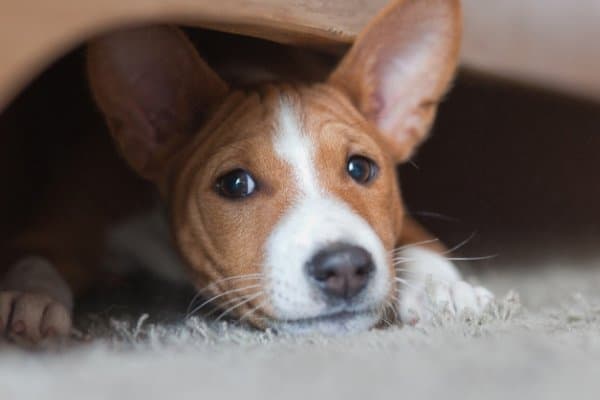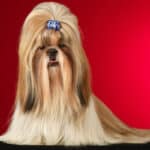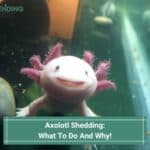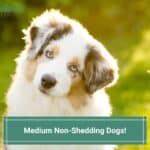Weighing in at just under 25 pounds, Basenjis are energetic, independent dogs who are often described as being cat-like in both their attitude and mannerisms.
Although not for everyone, with their expressive eyes, alert ears, and cute, curled tails Basenjis easily win the love and admiration of their owners.
Do Basenjis shed a lot? Basenjis do shed lightly year-round, though not nearly as much as other breeds. Much variance can occur within the breed in terms of shedding amounts based on several factors such as undercoat density, genetics, health issues, nutrition, and stress.
Shedding is a major concern for those who like a neat, clean house at all times and for those who suffer from allergies. If you are considering getting a Basenji, it is smart to learn beforehand what exactly you’ll be dealing with. Let’s take a look.
How Much Do Basenjis Shed?
Under normal circumstances, most Basenjis are light shedders. The coat consists of very short (just a few centimeters long), sleek hairs that practically glisten in the sunlight but when shed, are barely noticeable.
You may find a few hairs here and there, especially evident on black or dark fabric, but the shedding is nothing like what owners of heavy shedding breeds, like a Golden Retriever, experience.
Naturally, some Basenjis will shed a bit more than others and certain factors can cause a normally low-shedding Basenji to begin shedding excessively, but overall, Basenji shedding is relatively easy to deal with and can be drastically minimized with a quick brushing session once a week.
Fun Fact #1: Although Basenjis can make certain sounds, they are physically incapable of producing a true “bark,” and are known as barkless dogs.
What Factors Influence the Amount Basenjis Shed?
Shedding tendencies can vary significantly between individual Basenjis and can be influenced by a number of or combination of factors. The following are the most common causes for abnormal or excessive shedding.
Seasons
An increase in shedding is totally normal as the warmer days of spring approach and again as autumn draws near. This is known as seasonal shedding and is the body’s way of preparing for drastic temperature changes.
As the days steadily grow longer and warmer, your Basenji’s coat will gradually get rid of the thicker winter undercoat that protected him during the cold months. Over the course of a couple of weeks, tufts of soft, fluffy fur will give the coat a ragged appearance and will wind up all over the house if not routinely brushed out.
In the fall, you may notice a slight increase in shed hairs as the very light summer undercoat is released to make way for the warm, dense winter undercoat. This fall shedding is not usually nearly as dramatic as the spring shed because there are fewer hairs to lose and therefore less mess.
Undercoat
In some Basenji, the undercoat is so sparse that owners are not even aware of its presence. Other Basenji have a more noticeable undercoat. As you might guess, Basenjis with a heavier undercoat will tend to shed more than their lightly coated counterparts.
Basenjis living in colder climates where the temperature is routinely chilly will naturally keep a thicker undercoat year-round and experience less seasonal shedding.
Alternately, those living in a warm climate where the temperatures rarely dip close to freezing will consistently sport a very light undercoat, so light that it may not be very noticeable at all.
Genetics
The degree of shedding can be an inherited trait. If one or both parents were heavy shedders, there is a chance that the puppy will be too, and low-shedding parents will likely produce low-shedding puppies.
Be sure to ask your chosen breeder about the parents’ shedding tendencies before purchasing a puppy, and don’t be shy about asking to meet the parent dogs as this is one of the best ways to judge your new puppy’s future appearance, temperament, and yes, shedding tendencies.
Nutrition
A well balanced, nutrient-rich diet is mandatory for any dog to be able to maintain peak physical condition and a lustrous, healthy coat. When optimal levels of nutrition are not met daily, the skin and coat are often the first to suffer, and hair loss quickly becomes apparent.
Pregnancy/Lactation
It is very common for pregnant dogs and females who are nursing a litter of puppies to shed more than usual. Both pregnancy and lactation deplete the mother’s levels of calcium and other vital nutrients as her body makes caring for the pup’s priority. The result is often a dull, dry coat that loses more hair than normal. Supplements can help resolve this issue.
Stress
We all know that stress is not good for us. Well, it can have negative impacts on your dog as well, often in the form of additional shedding.
Have you ever noticed that your dog sheds like crazy in the waiting room of your veterinarian’s office? If so, you’ve witnessed the effects of stress on your dog’s coat.
Any major changes, such as moving to a new house or bringing home a new baby, or experiences that make your dog nervous, like a trip to the vet or a confrontation with a larger dog, can result in spontaneous, heavy shedding.
Sickness
Hypothyroidism, Cushing’s disease, and other underlying illnesses can cause an increase in shedding. If you’ve noticed that in addition to increased hair loss your Basenji isn’t acting normally or has shown a change in eating, drinking, and bathroom habits, do not hesitate to bring him to your veterinarian for a thorough exam.
Skin Conditions
Ringworm, dermatitis, mange, and fungal or bacterial infections are just a few skin conditions that are fairly common in dogs and result in either patchy hair loss or widespread, near-total body hair loss.
Allergies
Just like people, dogs can suffer from allergies though the allergic response often presents itself differently in dogs. In many cases, instead of itchy, watery eyes, sneezing, and coughing, dog allergies affect the skin causing dryness, flaking, hot spots, and itchiness. The more a dog scratches and tries to soothe the inflamed skin by licking, the more hair is lost.
Fun Fact #2: Basenjis are known for being meticulous about self-grooming and do not have that unmistakable “doggy” smell.
Are Basenjis Hypoallergenic?
While no dog is completely hypoallergenic, some dogs produce less dander than others and the proteins found in their saliva, urine, and dander are less likely to produce an allergic response.
Although Basenjis do shed, they are often well tolerated by individuals who are only mildly allergic.
However, not everyone responds the same. If you’re concerned about being allergic to your future dog, the best thing to do is to spend some time with a Basenji and see how your body reacts.
Bring along a towel or blanket, and, after asking permission from the owner, rub the dog all over, being sure that some hair actually clings to the fabric. That night, sleep with the fabric to see if any allergic response is triggered. It’s better to know beforehand, right?
How to Control the Mess
Brushing
Brushing your Basenji with a soft bristle brush, rubber brush, or grooming gloves at least once a week will help keep the amount of shed hair to a minimum. Of course, when your dog is experiencing seasonal shedding, the more often you brush, the better.
After brushing, many owners like to wipe a damp cloth over the entire coat to catch any remaining loose hairs and to give a nice, finished appearance.
Good Housekeeping
Maybe it goes without saying, but vacuuming regularly will help your clothes, floors, and furniture stay cleaner. A quality lint roller can work wonders too for your clothing and couch cushions.
Bathing
Although Basenjis do a great job of keeping themselves clean and won’t need to be bathed very often, using a deshedding shampoo during periods of seasonal shedding will loosen hairs that are ready to be shed and make it easier to brush dead hairs out of the coat.
Supplements
There are many soft, chewable supplements available that are designed to improve the health of your dog’s skin and reduce excessive shedding. Liquid supplements are another option and are simply poured over your dog’s regular meal.
Hydration
Making sure that your Basenji is drinking enough water is not only good for his overall health but will also keep the skin sufficiently hydrated which equates to a shiny, healthy coat that isn’t prone to excessive shedding.





